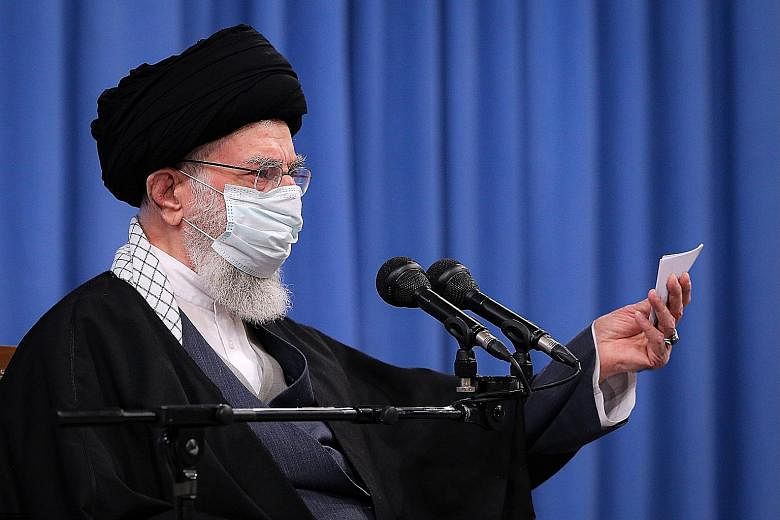DUBAI • Supreme Leader Ayatollah Ali Khamenei has said Iran might enrich uranium up to 60 per cent purity if the country needed it, and would never yield to American pressure over its nuclear programme, state television reported.
Iran's 2015 nuclear deal with six powers, which it has been breaching since the United States withdrew from the pact in 2018, caps the fissile purity to which Teheran can refine uranium at 3.67 per cent, well under the 20 per cent achieved before the agreement and far below the 90 per cent suitable for a nuclear weapon.
"Iran's uranium enrichment level will not be limited to 20 per cent. We will increase it to whatever level the country needs... We may increase it to 60 per cent," Mr Khamenei said on Monday, upping the ante in a stand-off with US President Joe Biden's administration over the future of the fraying deal.
"Americans and the European parties to the deal have used unjust language against Iran... Iran will not yield to pressure. Our stance will not change,"he added.
US State Department spokesman Ned Price said Mr Khamenei's comments "sound like a threat" and declined to respond to what he described as "hypotheticals" and "posturing".
However, he reiterated US willingness to engage in talks with Iran about returning to the 2015 nuclear deal. The deal between Iran, the US, Russia, China, Britain, France and Germany locked in restrictions on the Iranian nuclear programme, notably uranium enrichment, in exchange for sanctions relief.
Iran has always said its nuclear programme is entirely civilian.
The Biden administration said last week it was ready to talk to Iran about both nations returning to the accord abandoned by former US president Donald Trump. Teheran said last week it was studying a European Union proposal for an informal meeting between current members of the deal and the US, but has yet to respond to it.
Iran, which has resumed enriching to 20 per cent in an apparent bid to heap pressure on the US, has been at loggerheads with Washington over which side should take the initial step to revive the accord.
Although under domestic pressure to ease economic hardships worsened by sanctions, Iranian leaders insist the US must end its punitive campaign first to restore the deal, while Washington says Teheran must first return to full compliance.
Secretary of State Antony Blinken said on Monday that Washington intended to bolster and extend the 2015 pact.
Mr Blinken, addressing the Conference on Disarmament in Geneva, said in a pre-recorded speech: "The United States remains committed to ensuring that Iran never acquires a nuclear weapon. Diplomacy is the best path to achieve that goal."
Iran's envoy to the International Atomic Energy Agency, Mr Kazem Gharibabadi, said Iran had ended at midnight on Monday local time the implementation of the so-called Additional Protocol, which allows the agency to carry out short-notice inspections.
To create room for diplomacy, the UN watchdog on Sunday reached a deal with Iran to cushion the blow of the country's reduced cooperation and refusal to permit short-notice inspections.
Iranian lawmakers on Monday protested against Teheran's decision to permit "necessary" monitoring by UN inspectors for up to three months, saying this broke the new law.
REUTERS

